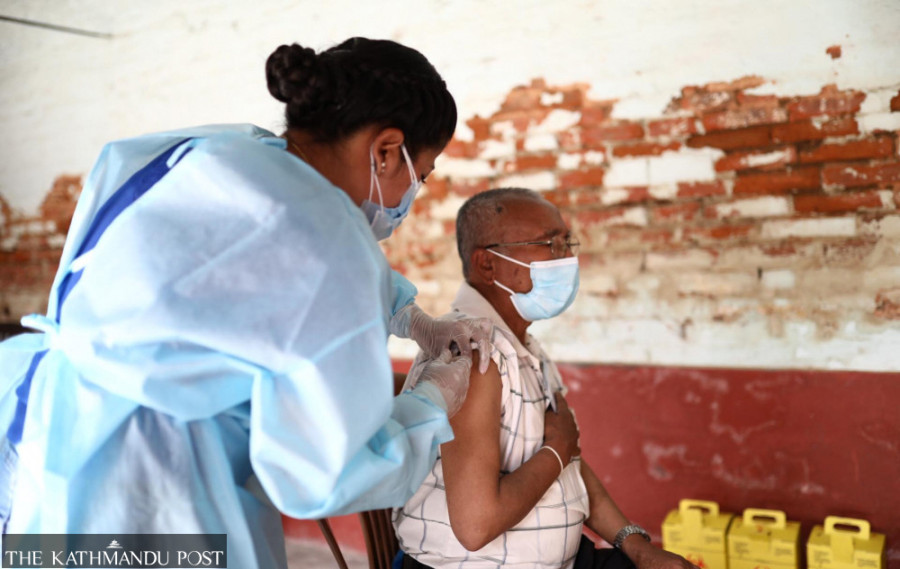Arjun Poudel, The Kathmandu Post, February 4, 2022
People over 50 years of age residing in densely populated areas and big cities are likely to get booster shots, once the current booster programme for people over 60 years is complete.

Officials at the Ministry of Health and Population said booster shots will be provided in stages starting with people over 50 years residing in densely populated areas and big cities while prioritising those in the risk groups and priority groups receiving the booster shot in the first stage.
“The eligible populations that have been immunised with Covid-19 vaccine will get the booster shots. The shots will be administered in stages with priority groups and those in the risk groups getting the shots first,” Dr Ramesh Dhakal, an expert adviser to Minister for Health and Population Birodh Khatiwada, told the Post. “The ministry is considering starting the booster doses first in big cities and densely populated areas, as per the risk assessment.”
The Health Ministry started the booster programme for frontline workers—doctors, nurses, paramedics, lab technicians, hospital staff and ambulance drivers—on January 16.
Journalists, bureaucrats, lawmakers, and those serving in diplomatic missions and financial institutions: prisoners, people living in old age homes, and refugees who were vaccinated in the first phase of the immunisation campaign starting January 27 last year were also administered booster shots.
Currently, people above 60 years, who were jabbed with the Vero Cell vaccine have been getting the booster shot.
Immuno-compromised individuals are also getting booster shots.
Officials said that booster shots for people above 50 years will start once the Sinovac-CoronaVac Covid-19 vaccine arrives in Nepal. The consignment is expected to land in Nepal on February 7, they said.
“We will also provide Pfizer-BioNTech Covid-19 vaccine for booster shots,” Dhakal said.
The Health Ministry said that the COVAX facility, the United Nations backed international vaccine sharing scheme, will supply 6.2 million doses of Pfizer vaccine soon.
Currently, the Health Ministry has been using AstraZeneca vaccine for second doses and booster shots, due to a lack of vaccines manufactured by other companies.
Studies show that the third dose of Sinovac CoronaVac increased antibodies, but the results were better when a different vaccine was used, according to the latest study that included 1,240 volunteers from the Brazilian cities of Sao Paulo and Salvador.
Antibody levels were low before the booster doses, with only 20.4 percent of adults aged 18-60 years and 8.9 percent of adults aged over 60 having detectable levels of neutralising antibodies. These were seen to significantly increase across every booster vaccine regimen, according to the study published in the Lancet medical journal.
Officials at the Ministry of Health and Population had said that boosters will be started once 40 percent of the total population is inoculated.
As of Thursday, 14,927,898 people or 51.1 percent of the total population have been fully vaccinated. The Health Ministry said that 70.7 percent of the targeted population above 18 years have been fully immunised.
“This is the collective success of all stakeholders—central, provincial and local governments—health workers, aid agencies and countries which have provided us with the vaccines,” said Dr Sangita Mishra, spokesperson for the Health Ministry.
Public health experts said that people administered with a Covid vaccine are eligible for booster shots and it is the responsibility of the government to ensure that the public gets the jabs.
“If the government does not have sufficient doses, it should make necessary arrangements to ensure that all eligible get the doses,” said Dr Jhalak Sharma, former chief of the National Immunistation Programme.
“Those who were vaccinated six months ago should be administered with booster shots now. Prioritising age groups and risk groups is a good decision.”
Experts say Omicron, a highly contagious variant of the coronavirus, is neither the latest nor the last variant of the virus, which has wreaked havoc across the globe. Currently, a new Omicron variant BA.2 is spreading in many countries including Nepal.
“Vaccine is the only available means to lessen the severity and possible deaths from Covid infections,” said Dr Biraj Karmacharya, an epidemiologist. “Authorities concerned should try their best to administer booster shots to all those eligible and find the people who have not received even a single dose of vaccine yet.”
So far, Nepal has received 45,737,840 doses of vaccines, including AstraZeneca, Vero Cell, Moderna, Janssen and Pfizer-BioNTech.
On Thursday, 3,175 people tested positive for Covid-19—2,742 in 10,026 polymerase chain reaction tests and 433 in 2,579 antigen tests. In the last 24 hours, 14 people died of coronavirus infection.
Active case stands at 63,296 throughout the country.
Meanwhile, the World Health Organisation Nepal on Thursday congratulated Nepal for reaching another crucial milestone of fully vaccinating 70 percent of the adult population (above 18 years).
“Congratulations Nepal for reaching another crucial milestone. 70 % of the adult population ( > 18 years) have now received a full Covid-19 vaccine course.” WHO Nepal tweeted.
Source: https://tkpo.st/3gonFb6